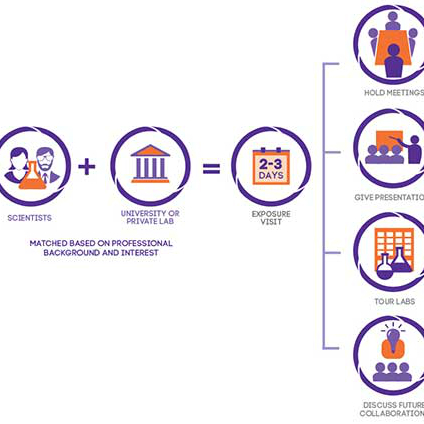How Afghan Scientists are Boosting their Ability to Fight Deadly Diseases

Though Afghanistan is not typically in the news for epidemics and public health crises, communities in the South Asian country have struggled against infectious diseases like brucellosis, avian influenza, Q-fever and Crimean-Congo hemorrhagic fever. Afghanistan also battles high rates of infant mortality and malnutrition, underscoring the impact that diseases have on future generations.
However, Afghan researchers and the Ministry of Public Health are working hard to turn the health situation around.
“Afghanistan’s scientists are in the process of playing catch up to the international science community. There are several good medical schools but many Afghan researchers are still educated abroad in Pakistan, India, Australia and the U.S.,” said Megan Tribble, Associate Project Manager at CRDF Global.
The Afghanistan Professional Network Building, Training and Exposure (NBTE) Program is a CRDF Global initiative – funded by the U.S. government’s Cooperative Biological Engagement Program – that provides opportunities for bioscientists to participate in international scientific conferences and visit international research institutions.
The NBTE program is driven by two guiding principles:
Connecting scientists from low-resource countries with professional contacts increases potential research collaboration and partnership opportunities.
Exposing researchers to the latest research topics and techniques leads to scientists’ conducting science responsibly and improves biosafety, biosecurity and public and animal health policies in countries with under-developed medical, diagnostic and research infrastructure.
Public health experts in Afghanistan are keenly aware of the importance of being connected with the international scientific community.
“There is a big gap between Afghanistan and the developed world in terms of lab capabilities,” said Dr. Islam Saeed, an NBTE participant who visited Harvard School of Public Health after presenting at the American Society for Microbiology’s Biodefense and Emerging Diseases Research Meeting in 2015. “Afghanistan and other developing countries, as well as in-conflict countries, are mostly isolated from other parts of the world and they are continuing their activities based on obsolete and outdated knowledge and technology. Due to limited resources and competing priorities, they can’t keep abreast of new advancement in different disciplines including public health laboratories.”
To help close this gap, CRDF Global connects Afghan scientists with universities and private laboratories around the world. Through CRDF Global’s NBTE program, researchers have travelled to the U.S., Italy and Switzerland to receive training on the essential components needed to be integrated into the international scientific community. A key part of the program is their attendance at a professional conference. Well in advance of travel, CRDF Global works with each researcher to provide training on critical skills such as creating and submitting an abstract and presenting their research at scientific conferences. CRDF Global staff travels with each grantee to provide on-site networking support during conferences.
“We provide one-on-one guidance on submitting the best abstract possible. Usually the grantees have all the key information needed, they just aren’t aware of what conferences are looking for in an abstract,” said Megan. “Once they are accepted, I work with them to create a poster presentation according to the conference guidelines and walk them through the conference agenda. We arrange their travel, hotel, medical insurance and pay for conference registration.”
After attending a conference, each scientist spends two-three days at the host lab in what is called an exposure visit. Hosts are carefully selected based on the professional backgrounds and interests of each scientist. During exposure visits they hold meetings, tour labs, give presentations to faculty and staff and discuss potential research collaborations.
Many of the researchers have never attended a scientific conference, and even less have attended an international conference. Their participation in prestigious conferences followed by a tailored laboratory visit provides them with a unique opportunity to present their research to the international scientific community and expand network of contacts in their field.
“Developing abstracts, working to practically present proven data, learning new ideas in the field of biosecurity and biosafety, and networking with the international scientists will really help me in my future career. Such programs show scientists from developing countries how to improve, how to implement, what to do and what not to do,” said Dr. Redi Alami, an NBTE participant who presented at the American Association for the Advancement of Science’s annual meeting in 2015.
In last year’s first round of the program, 11 Afghan public health practitioners travelled to the U.S., Italy and Switzerland to collaborate on detecting and preventing infectious diseases, not only for the future of Afghanistan, but the world as a whole. As a result, several of the participants have established relationships with individual scientists at research institutions across different countries. They are also improving laboratory diagnostic capacity in Afghanistan by updating standard operating procedures, implementing new techniques and training laboratory staff in biosafety and biosecurity. These researchers are leading efforts to change lab culture and expand research funding opportunities to better serve Afghan society’s public health needs.
“The world is a global village and the problem of infectious diseases, which have the potential for outbreaks and pandemics, not only affect the host countries, but also spread to other parts of the world. In order to ensure global health security there needs to be a combined effort from all countries,” said Dr. Saeed.



